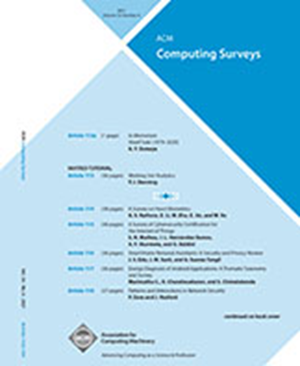系统视角下的事件预测方法综述:整合不同研究领域
IF 28
1区 计算机科学
Q1 COMPUTER SCIENCE, THEORY & METHODS
引用次数: 0
摘要
事件预测是预测未来事件的能力,即未来现实世界发生的事件,旨在支持用户决定将未来事件改变为期望状态的操作。事件预测方法学习过去事件和未来事件的特征之间的关系。它应用于新观察到的事件,以预测相应的未来事件,这些事件是根据用户期望的未来状态进行评估的。如果预测的未来事件不符合此状态,则采取行动以实现理想的未来状态。显然,事件预测在商业和自然灾害等许多应用领域都很有价值。应用领域的多样性导致了分散在不同研究领域的各种方法,而这些研究领域又使用不同的术语来描述事件预测方法。因此,开发未来事件预测方法的方法和知识共享受到限制。为了通过事件预测方法的综合集成和评估促进知识共享,我们从系统的角度将事件预测方法集成到单个系统中,引出需求,并根据需求评估现有工作。基于评估,我们确定了开放的挑战,并讨论了未来的研究方向。本文章由计算机程序翻译,如有差异,请以英文原文为准。
A Survey on Event Prediction Methods from a Systems Perspective: Bringing Together Disparate Research Areas
Event prediction is the ability of anticipating future events, i.e., future real-world occurrences, and aims to support the user in deciding on actions that change future events towards a desired state. An event prediction method learns the relation between features of past events and future events. It is applied to newly observed events to predict corresponding future events that are evaluated with respect to the user’s desired future state. If the predicted future events do not comply with this state, actions are taken towards achieving desirable future states. Evidently, event prediction is valuable in many application domains such as business and natural disasters. The diversity of application domains results in a diverse range of methods that are scattered across various research areas which, in turn, use different terminology for event prediction methods. Consequently, sharing methods and knowledge for developing future event prediction methods is restricted. To facilitate knowledge sharing on account of a comprehensive integration and assessment of event prediction methods, we take a systems perspective to integrate event prediction methods into a single system, elicit requirements, and assess existing work with respect to the requirements. Based on the assessment, we identify open challenges and discuss future research directions.
求助全文
通过发布文献求助,成功后即可免费获取论文全文。
去求助
来源期刊

ACM Computing Surveys
工程技术-计算机:理论方法
CiteScore
33.20
自引率
0.60%
发文量
372
审稿时长
12 months
期刊介绍:
ACM Computing Surveys is an academic journal that focuses on publishing surveys and tutorials on various areas of computing research and practice. The journal aims to provide comprehensive and easily understandable articles that guide readers through the literature and help them understand topics outside their specialties. In terms of impact, CSUR has a high reputation with a 2022 Impact Factor of 16.6. It is ranked 3rd out of 111 journals in the field of Computer Science Theory & Methods.
ACM Computing Surveys is indexed and abstracted in various services, including AI2 Semantic Scholar, Baidu, Clarivate/ISI: JCR, CNKI, DeepDyve, DTU, EBSCO: EDS/HOST, and IET Inspec, among others.
 求助内容:
求助内容: 应助结果提醒方式:
应助结果提醒方式:


